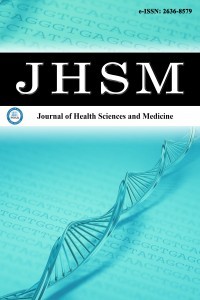Interference of high dose intravenous vitamin C with blood glucose testing in a patient with COVID-19 infection
Interference of high dose intravenous vitamin C with blood glucose testing in a patient with COVID-19 infection
___
- Rodbard D. Continuous glucose monitoring: a review of recent studies demonstrating improved glycemic outcomes. Diabetes Technol Ther 2017; 19: 25–37.
- Blum A. Freestyle libre glucose monitoring system. Clin Diabetes 2018; 36: 203–4.
- Wang D, Hu B, Hu C, et al. Clinical characteristics of 138 hospitalized patients with 2019 novel Coronavirus–infected pneumonia in Wuhan, China. JAMA 2020; 323: 1061.
- Chen N, Zhou M, Dong X, et al. Epidemiological and clinical characteristics of 99 cases of 2019 novel coronavirus pneumonia in Wuhan, China: a descriptive study. Lancet 2020; 395: 507–13.
- Tang Z, Du X, Louie RF, Kost GJ. Effects of drugs on glucose measurements with handheld glucose meters and a portable glucose analyzer. Am J Clin Pathol 2000; 113: 75–86.
- Boretti A, Banik BK. Intravenous Vitamin C for reduction of cytokines storm in acute respiratory distress syndrome. PharmaNutrition 2020; 12: 100190.
- Cheng RZ. Can early and a high intravenous dose of vitamin C prevent and treat coronavirus disease 2019 (COVID-19)? Med Drug Discov 2020; 5: 100028.
- Hecker L. Mechanisms and consequences of oxidative stress in lung disease: therapeutic implications for an aging populace. Am J Physiol Cell Mol Physiol 2018; 314: 642–53.
- Basu A, Slama MQ, Nicholson WT, et al. Continuous glucose monitor interference with commonly prescribed medications: a pilot study. J Diabetes Sci Technol 2017; 11: 936–41.
- Calhoun P, Johnson TK, Hughes J, Price D, Balo AK. Resistance to acetaminophen interference in a novel continuous glucose monitoring system. J Diabetes Sci Technol 2018; 12: 393–6.
- Mason SA, Rasmussen B, van Loon LJC, Salmon J, Wadley GD. Ascorbic acid supplementation improves postprandial glycaemic control and blood pressure in individuals with type 2 diabetes: Findings of a randomized cross-over trial. Diabetes Obes Metab 2019; 21: 674–82.
- Ashor AW, Werner AD, Lara J, Willis ND, Mathers JC, Siervo M. Effects of vitamin C supplementation on glycaemic control: a systematic review and meta-analysis of randomized controlled trials. Eur J Clin Nutr 2017; 71: 1371–80.
- Doupis J, Avramidis K. Managing diabetes during the COVID-19 pandemic. Eur Endocrinol 2020; 16: 85.
- Yayın Aralığı: Yılda 6 Sayı
- Başlangıç: 2018
- Yayıncı: MediHealth Academy Yayıncılık
Ökkeş Hakan MİNİKSAR, Dilşad YILDIZ MİNİKSAR, Erol TOY
Gülçin ERTAŞ, Ali Rıza ÜÇER, Can AZAK, Muzaffer Bedri ALTUNDAĞ
Kübra ATAY, Ayşe Burçin UYUMLU, Basri SATILMIŞ, Aslı ÇETİN, Hatice ÇAĞLAR YILMAZ
Distribution of clinical isolates obtained from sterile body fluids: a four-year retrospective data
Alev ÇETİN DURAN, Tuğba KULA ATİK, Nermin ÖZEN, Ali Korhan SİG, Onur IRMAK
Muharrem BAYRAK, Gökhan ÖZPOLAT
İbrahim Güven ÇOŞĞUN, Sule CİLEKAR, Aydın BALCI, Ersin GÜNAY
Ozgur OZTAN, Vugar Ali TÜRKSOY, Serdar DENİZ, Ayşe COŞKUN BEYAN, Servet Birgin İRİTAŞ, Müjgan ERCAN, Engin TUTKUN
Veysel Garani SOYLU, Sedat GÜLTEN, Ayşe YILMAZ, Öztürk TAŞKIN, Ufuk DEMİR, Funda ÇATAN İNAN
Is macrocytic erythrocyte a new prognostic parameter in critical COVID-19 disease?
Veysel Garani SOYLU, Sedat GÜLTEN, Ayşe YILMAZ, Öztürk TAŞKIN, Ufuk DEMİR, Funda ÇATAN İNAN
